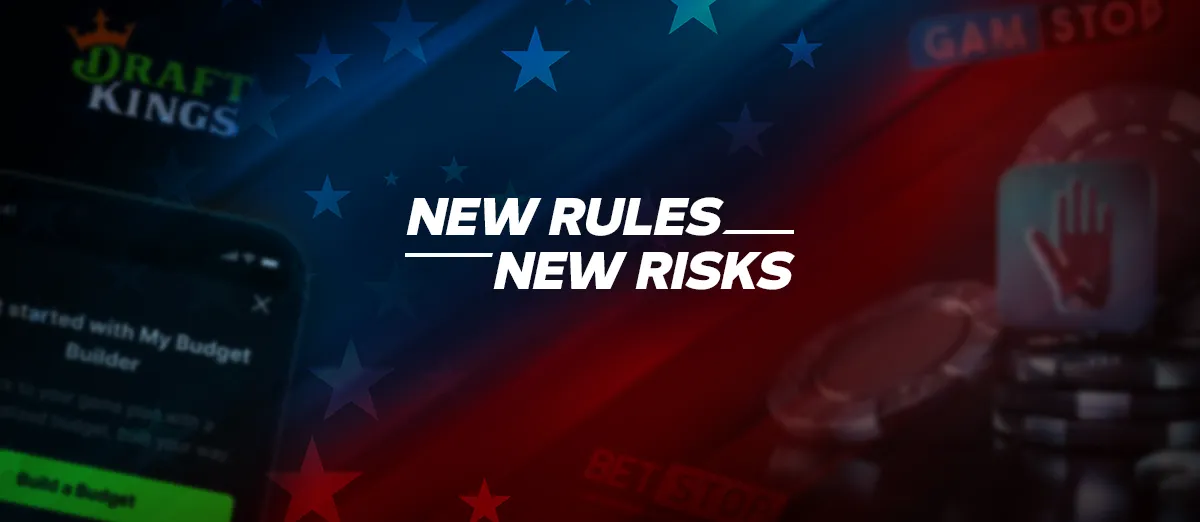How Responsible Gambling Is Reshaping U.S. Gambling Laws and Culture?

Across the vast and increasingly competitive gambling landscape of the United States, responsible gambling is no longer a backroom compliance obligation or a forgotten footer tab on an operator’s website.
It has become a political, social, and psychological touchpoint, to say nothing of economic permutations. It is now a frontline issue, shaping legislation, platform design, and public discourse in equal measure.
With more than thirty US states having legalized online casinos or sports betting, the challenge no longer lies solely in regulating access or ensuring fair odds. Instead, the more complex and pressing issue is how to protect consumers from harm while still supporting a thriving and innovative industry.
This evolution is exemplified by DraftKings’ recent launch of its Budget Builder tool. Far from being a perfunctory spending cap or warning message, the tool acts as a digital guide to financial planning within the context of gambling. It encourages users to consider their betting in light of broader financial goals, rent payments, and savings plans.
In doing so, it reframes gambling behavior as something that must sit alongside responsibility rather than recklessness. It is a bold move that is already sending ripples through state legislatures and industry boardrooms alike.
The Impact of Budget Builder on Gambling Economics
At first glance, responsible gambling tools like Budget Builder may seem counterintuitive to profit-making. Operators rely heavily on high-frequency betting and impulse-driven engagement. Anything that disrupts that cadence can appear to threaten short-term revenues. But this view is becoming outdated. Companies such as DraftKings appear to be seeing the long game – reputation is far more valuable than turning a quick buck.
DraftKings’ Budget Builder tool promotes the kind of behavior that can elongate the player lifecycle. By helping bettors avoid catastrophic losses and burnout, it reduces the number of users who self-exclude, fall into debt, or abandon platforms altogether. Instead of fueling sharp spikes and sudden declines in user activity, the tool supports a more measured and sustained form of engagement. Over time, this encourages consistent revenue without the reputational risks associated with customer harm.
State governments have a vested interest in this long view. In places like New Jersey, Pennsylvania, and Michigan, gambling tax revenues are no longer ancillary windfalls. They form part of core budget planning, funding everything from school programs to transport infrastructure. A collapse in public trust or an increase in gambling harm could trigger backlash, litigation, and political scrutiny that puts those revenues in jeopardy.
Budget Builder, therefore, is not simply a customer support tool. It is an economic buffer. It signals a maturing market where sustainability and safeguarding are part of the financial equation. It protects not just the individual bettor, but also the fiscal stability of the states that depend on them. In the long term, this could prove to be good for everyone.

The Politics Behind Responsible Gambling
As the economic stakes rise, so too does the political significance of responsible gambling. Lawmakers across the United States are learning that public trust in gambling policy is hard-won and easily lost. With growing media attention on problem gambling and celebrity scandals fueling debate, state legislators are walking a tightrope between commercial ambition and social accountability.
Progressive states with a history of public health investment, such as Illinois and Massachusetts, have taken the lead in requiring robust responsible gambling measures as a prerequisite for market participation. These jurisdictions understand that voter perception matters. In such contexts, the deployment of tools like Budget Builder is not only expected but politically necessary. It provides a tangible answer to inevitable questions about harm minimization and corporate duty of care.
In more conservative or libertarian leaning regions such as Texas or Tennessee, the politics of responsible gambling take on a different texture. Here, government intervention is often viewed with suspicion. Mandated restrictions risk being painted as overreach or moral policing. In these cases, voluntary tools that center user autonomy, such as Budget Builder, can strike a delicate balance. They allow politicians to claim consumer protection without invoking the specter of nanny state interference.
More broadly, visible responsible gambling frameworks provide a degree of political insulation. Should a high-profile incident of gambling addiction or public debt emerge, elected officials can point to these tools as evidence of proactive governance. They offer proof that the market is not entirely left to its own devices. In states where gambling legislation remains on the table, this insulation may be critical to pushing new bills over the line.
When Betting Becomes Mainstream – Navigating Culture Wars and Social Change
A decade or so ago, gambling in the United States existed largely on the periphery. Today, it is not only legal in much of the country but actively celebrated. Betting lines flash across sports broadcasts. Influencers post their slips for clout. Celebrities partner with sportsbooks to promote parlays and odds boosts. Gambling has moved from the backroom to the billboard, bringing both normalization and risk in its wake.
As gambling becomes more ingrained in everyday American culture, the need for socially embedded safeguards grows more urgent. Operators must not only respond to regulatory expectations but also to shifting cultural expectations around ethics and empathy. Embedding responsible online gambling tools, like Mindway AI's Gamalyze, which was part of CasinoReviews' Bet on Awareness initiative, into the platform interface is no longer a nice-to-have; it is a brand imperative.
Budget Builder is one such tool that fits the moment. It aligns gambling with financial literacy, a value that resonates across age groups and socioeconomic backgrounds. It demystifies the act of budgeting within a gambling context, turning what was once seen as taboo into a talking point. This is particularly important in communities that have historically borne the brunt of gambling-related harm. In marginalized or low-income areas, responsible gambling tools become more than safeguards – they become vehicles for empowerment.
Internally, the presence of such tools has a knock-on effect. Marketing teams begin to assess campaign messages through a responsible lens. Customer service representatives receive training in recognizing signs of distress. Product designers consider friction and reflection points in the user journey. In this way, responsible gambling shifts from being a bolt-on feature to a foundational mindset.
Prevention Over Punishment on the Psychological Battleground
Gambling addiction is not always visible. It rarely manifests physically and often hides in plain sight. It is a condition that thrives on secrecy, rationalization, and compulsive thought cycles. That is why effective responsible gambling tools must go deeper than setting monetary caps. They must engage with the user’s cognitive and emotional state.
DraftKings’ Budget Builder does this by reframing gambling within the larger context of personal finance. Users are prompted to think not just about how much they want to bet, but about what else that money could be used for. Rent. Groceries. Credit card repayments. The act of betting becomes part of a wider reflective process, interrupting the dopamine loop that fuels compulsive behaviors.
This aligns closely with insights from behavioral science. Individuals make more rational choices when they are encouraged to visualize their future selves, according to the Future self-continuity study. Budget Builder functions like a psychological mirror. It does not scold or block, but rather invites collaboration. It is not a wall, but a window.
International markets have been deploying similar strategies with success. The UK’s GAMSTOP, for instance, allows users to self-exclude from all licensed operators in one action, reducing the friction and emotional fatigue associated with navigating multiple platforms. Sweden’s Playscan employs artificial intelligence to detect erratic betting patterns and trigger early interventions. These systems provide real-time data-driven support, rather than relying on retrospective damage control.
For the United States, with its patchwork of state regulators, achieving unified systems will be a challenge. But operators can still act independently to implement smarter tools. DraftKings’ Budget Builder is a clear signal that meaningful progress does not require federal mandates – only market leadership and moral commitment.
What the U.S. Can Learn from Abroad?
If the United States wishes to lead in responsible gambling innovation, it must also be willing to learn. Countries like the United Kingdom, Sweden, Canada, and Australia offer tested frameworks that demonstrate the benefits of proactive consumer protection.
GAMSTOP in the UK remains the gold standard for centralized self-exclusion and, indeed, the country seems to lead the way in responsible gambling measures. GAMSTOP provides a single, cross-operator opt-out that removes temptation and streamlines protection. Meanwhile, there are a number of other tools that UK-based gambling firms offer as well, including deposit limits, novel session reminders and self-exclusion schemes among others.
Implementing a similar program to GAMSTOP in the US would require significant coordination, but the returns in public trust and harm reduction could be substantial.
Sweden’s Playscan system leverages user data to create behavioral profiles and alert operators to risk factors. When combined with human support teams, it forms a powerful safety net. In a country where online behavior is already heavily tracked for marketing purposes, it makes sense to use that same infrastructure to prevent harm.
Canada’s Ontario online casino market introduces another key concept: enforced cooling-off periods. Players who raise their deposit limits must wait thirty days before the change takes effect. This delay adds an essential pause, curbing the emotional spikes that often lead to financial regret. If integrated with Budget Builder, such friction points could provide even stronger barriers against impulse-driven loss chasing.
Meanwhile, Australia’s BetStop introduces a more controversial but compelling idea: third-party exclusion. Here, family members or healthcare professionals can initiate exclusion for individuals deemed at risk, which can be playing with fire. Notably, the program has seen significant uptake, reaching over 30,000 sign-ups as of October 2024. While this approach would face legal and privacy challenges in the US, a carefully regulated variant could offer protection for vulnerable players whose judgment is impaired by addiction.
The Future Belongs to Responsible Leaders
The launch of Budget Builder marks more than a product release. It represents a philosophical pivot in how the gambling industry views its relationship with the public. Operators are beginning to understand that the most valuable asset is not margin or market share – alas, it is trust.
To cultivate this trust, responsible gambling must be embedded into every facet of the experience. Not just the interface, but the incentives. Not just the tools, but the tone. This is the path to long-term profitability, legislative support, and cultural legitimacy.
The question for the industry is no longer whether responsible gambling tools will become standard. The question is who will lead the movement and who will be forced to follow. In a sector built on risk, this is one area where certainty (and common sense) should reign.





Review this Blog
Leave a Comment
User Comments
comments for How Responsible Gambling Is Reshaping U.S. Gambling Laws and Culture?